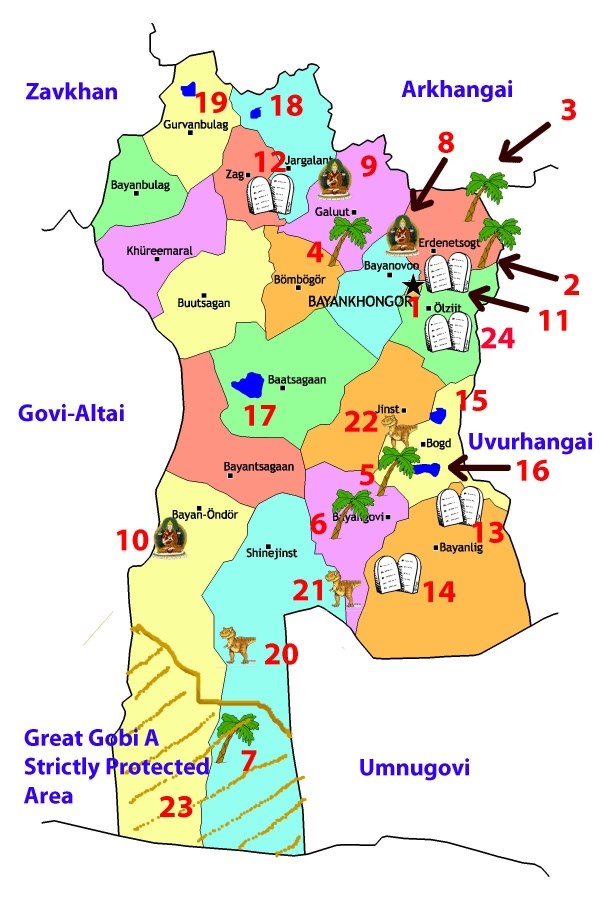Beautiful Bayankhongor Province is located in the central-western part of Mongolia. "Bayan" means rich and "khongor" sometimes means darling. With an area of 116 thousand square kilometers, Bayankhongor sure has a lot of darling, darling.
Bayankhongor encompasses three major geographical zones including a lush northern forest zone (hangai), the central grass steppe zone and the awe inspiring Gobi Desert zone. There are many attractions to see in Bayankhongor including natural sites like the Shargaljuut Hot Springs and man-made structures like the Chess Stones of Erdentsogt. In addition there is a wealth of Flora and Fauna including such rare species as the Gobi Bear.
The information on this site is useful for independent travelers, group travelers, you crazy Mongol Rally folk, you crazier people that follow Mongol Rally folk and the many of you that visit Bayankhongor outfitted with refurbished WWII resupply vehicles in case Chinggis' Mongol hordes resurface.
History & Current
Bayankhongor aimag was formed in 1941 with the establishment of the Bayankhongor Citizen's Assembly. There were originally 16 Bayankhongor Area Soums and about 41 thousand people in the aimag. The aimag was originally named "Govi-Bumbugur", however it was soon changed to Bayankhongor.
In April of 1976, Bayankhongor was awarded the outstanding Red award for livestock, meat, and wool production. The aimag had substantial investment from the former USSR including infrastructure and education. Unfortunately the former USSR also crippled much of Bayankhongor's culture by purging monastaries and monks including famed monastaries like the Geegin Monastary.
Bayankhongor has also been home or hunting grounds for some interesting characters including the famed Lama Dambijant or Ja Lama who spent some time in the Ekhin Gol area practicing, rather successfully, banditry after an unsuccesful bid for Mongolian independence. In addition to the famed or fake Ja Lama, the 13th Dalai Lama also passed through Bayankhongor while fleeing from Tibet.
The dzud, or great storm, of the early 2000s devastated Bayankhongor and it took years for the aimag to replenish its livestock. The dzud also forced social change in the aimag since fewer people now rely on herding as a major source of income and more people have moved to the aimag center to work or at least stay warm.
Since then the aimag has grown substantially and there are now 80,000 people in the aimag, 25-30,000 people in the aimag center depending on the season and much fewer lama-turned-mercenaries in the countryside. There are excellent economic opportunities in the aimag including construction, education and tourism. Despite these opportunities Bayankhongor is home to many Ninja Miners who unsafely mine gold with mercury - a tool for separating it from other minerals. The government and various NGOs have been working closely with the miners to reduce unsafe mining in Bayankhongor. Besides that, there have been many positive changes in Bayankhongor in recent years including further development of the roads from Ulaanbaatar to Bayankhongor and a spate of new restaurants serving tastier and healthier food including vegetarian fare.
Nature
There are numerous rivers, mountains and sand dunes spread over the 116 thousand sq. kilometers of Bayankhongor. Ikh Bogd, located just outside Bogd Soum, is the tallest mountain in Bayankhongor at 3957 meters tall. It is an excellent site for aspiring climbers!
Bayankhongor is also famed for its many hot and cold springs including Shargaljuut which has more than 300 springs.
Parts of the Gobi A: Strictly Protected Area and Gurvan Saihan Park are also located in Bayankhongor to help preserve Bayankhongor's unique flora and fauna.
Thanks,
WELCOME TO BAYANKHONGOR PROVINCE
2014-12-11

